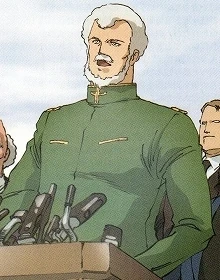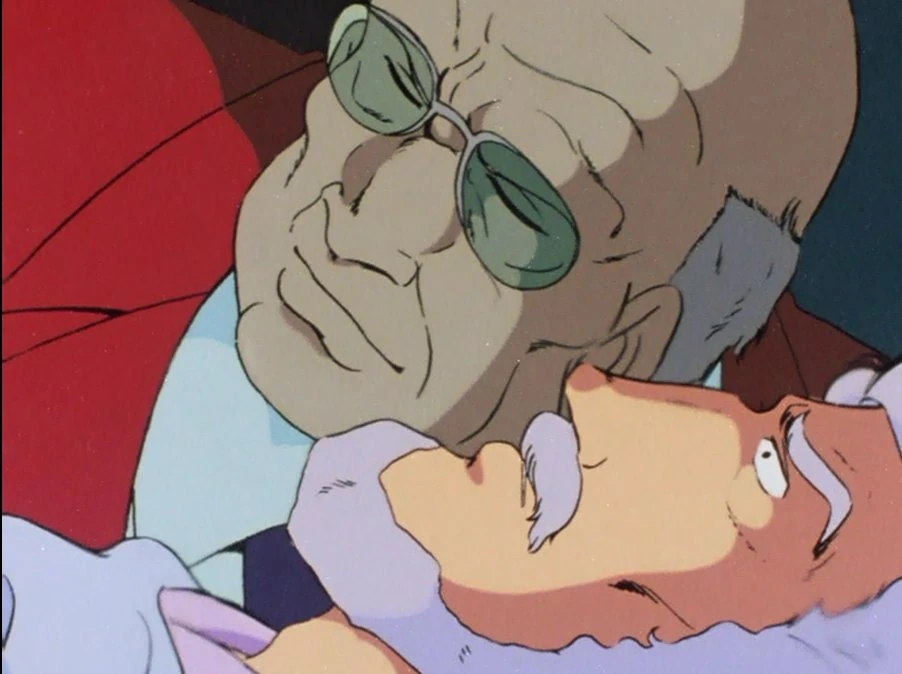Within the universe of Mobile Suit Gundam, few figures have had as lasting and significant an impact as Zeon Zum Deikun. Although his life was relatively brief and his death shrouded in mystery, his ideas and beliefs about the independence of the inhabitants of space (or Spacenoids) planted the seeds for one of the most epic and devastating conflicts in science fiction history: the One Year War. This article explores the life, philosophy, and legacy of Zeon Zum Deikun, and how his ideals shaped the Principality of Zeon and the never-ending struggle for freedom and justice in space.
The Early Years and Rise of Zeon Zum Deikun
Zeon Zum Deikun was born at a time when humanity had already begun expanding into space, and many space colonies were in full development. However, these colonies, despite their technological advances, were subject to the authority of the Earth Federation, a centralized organization that governed from Earth and maintained firm control over the colonies. This system created growing tension and resentment among the colonists, who felt that their voices were unheard and their resources exploited for the benefit of an increasingly depleted Earth.

Deikun stood out as an intellectual and philosopher who questioned the legitimacy of Earth's control over the colonies. According to him, humanity needed to evolve, both socially and spiritually, and unlock its potential by living in space. As his popularity grew, so did his political influence, and he soon became the leader of a rising community that shared his ideals and desire for emancipation.
The Space Destiny Theory and Deikun's Philosophy
One of the central concepts in Deikun's philosophy is the so-called "Space Destiny Theory." Deikun argued that Spacenoids represented the next step in human evolution, a "new type" of human being capable of living and adapting to the conditions of outer space. According to Deikun, constant contact with space and living in an environment so different from Earth would allow humanity to reach a higher level of consciousness and spiritual evolution.
Furthermore, Deikun believed that Earth was in a state of decay, burdened by a population and environment that could no longer sustain themselves. This deterioration of Earth made humanity in space responsible for evolving and breaking away from the systems of oppression that prevailed on their home planet. Thus, Deikun saw the colonies as an opportunity for a new, just society, free from the vices of old humanity.
The Foundation of the Republic of Zeon
Driven by his growing base of followers, Deikun took a crucial step: the foundation of the Republic of Zeon, an autonomous entity seeking to emancipate itself from the oppression of the Earth Federation. This republic was seen as a viable and promising alternative for those who desired a life free from Earth's influence. However, the path to independence was not easy. The Earth Federation viewed Zeon's movement with suspicion and feared that his subversive ideas would spread to other colonies, destabilizing the control they exercised over them.
The Republic of Zeon became the stronghold of Deikun's ideology and the place where his followers, known as Zeonists, could live according to the principles he promoted. However, the struggle for independence was complex, and the republic soon faced a series of internal and external challenges that threatened to tear it apart from the outset.
The Mysterious Death of Deikun and the Fall of the Dream
Deikun's dream of a free and just republic came to an abrupt and tragic end with his mysterious death. Whether his death was an accident, a natural cause, or, as many believe, an assassination remains a subject of debate. Conspiracy theories abound, with many believing that the Zabi family, an influential political family within Zeon, was behind his disappearance. According to this theory, the Zabi family saw Deikun as a threat to their own interests and took the opportunity to seize control of the republic and transform it into a military dictatorship.

After Deikun's death, the Zabi family took power and transformed the Republic of Zeon into the Principality of Zeon, a militarized state that distorted many of Deikun's original ideals. Under the leadership of Degwin Sodo Zabi and his children, especially the ambitious Gihren Zabi, Zeon embarked on a policy of military expansion that eventually led to the outbreak of the One Year War, one of the most devastating wars in human history.
Deikun's Legacy in the Principality of Zeon
Although the Zabi family betrayed many of Deikun's ideals, his legacy endured in the philosophy of the Principality of Zeon. Throughout the Gundam series, various characters, both followers and opponents, evoke Deikun's ideas and his vision of humanity in space. Deikun's figure becomes a symbol of resistance for those seeking a just society free from oppression, and his Space Destiny Theory continues to resonate as an ideal that inspires both Zeon soldiers and civilians seeking genuine change.
However, the Principality of Zeon, under the Zabi family, turned this philosophy of liberation into an excuse for expansion and war. Instead of uniting humanity in space, the war further divided the Spacenoids and deepened the rift between the colonies and Earth. This betrayal of Deikun's ideals left a lasting mark on Zeon's history and cast doubt on the value of the ideology on which the movement was founded.
Char Aznable and the Revenge of the Ideal
Zeon Zum Deikun's son, Casval Rem Deikun, also known as Char Aznable, emerges as a central figure in his father's legacy. Under his hidden identity, Char infiltrates the Principality of Zeon and embarks on a path of vengeance against the Zabi family, whom he blames for his father's death and the corruption of his ideals. Char embodies a radical version of Deikun's ideals, blending his beliefs in the Space Destiny with a deep hatred for those who took advantage of his family.
Throughout the saga, Char is a character who inspires both fear and admiration. Although his struggle is personal, he also represents the ongoing battle between Zeon Zum Deikun's ideals and the distorted reality the Zabi family imposed on the Principality of Zeon. Deikun's legacy continues, but transformed by hatred and violence, a tragic reminder of what could have been a peaceful revolution.
The Lasting Influence of Zeon Zum Deikun
Zeon Zum Deikun left a profound mark on the history of Gundam and the struggle for freedom and justice in the universe. His ideas about the emancipation of Spacenoids and his vision of a future where humanity can evolve in space inspire generations of characters within the saga, from Zeon leaders to soldiers and civilians seeking real change. However, his legacy is also a warning about how ideals can be distorted and used to justify power and oppression.
Deikun remains an ambiguous figure, a tragic hero whose dreams of justice were transformed into a nightmare of war and death. The story of Zeon Zum Deikun invites us to reflect on the nature of freedom, human evolution, and the price of independence.
What do you think about Zeon Zum Deikun's ideals? If you're a Gundam fan, you're sure to be passionate about learning these details about Zeon Zum Deikun. Share your thoughts in the comments about his story and how it impacts the Gundam narrative!


